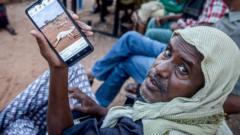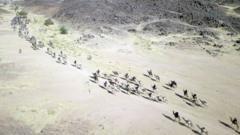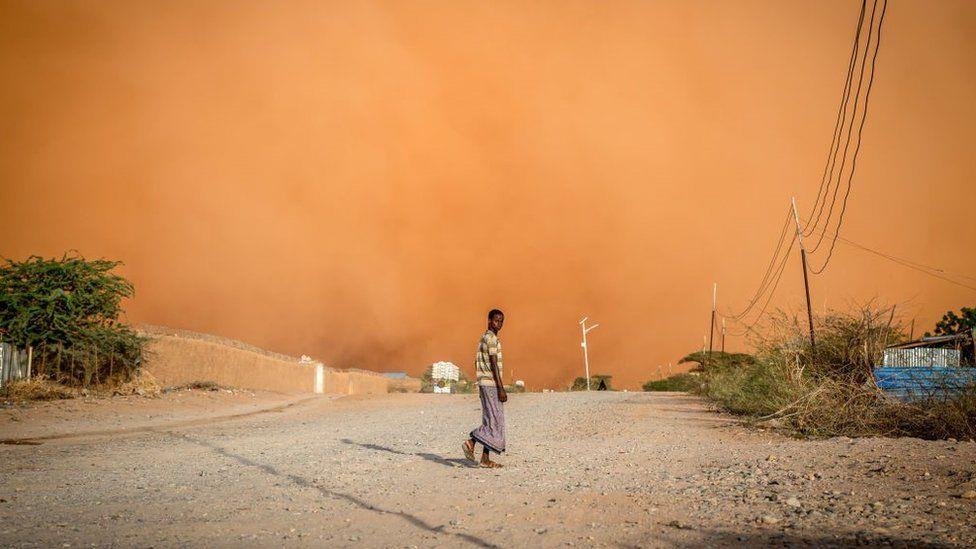
Why Africa Could Not Get Global Backing For Droughts Deal
So it was fitting that Ivory Coast hosted this month's UN-convened summit on the devastating effects of the three Ds – drought, desertification, and degradation of land.
However, not much was achieved at the two-week-long meeting in Abidjan to tackle these crises.
Many African countries argued for a legally binding global agreement to tackle droughts – something like the Kyoto protocol launched in 1997 to cut down carbon emissions, sources told the BBC.
Uganda and Angola were among the states to amplify the demand of the Africa bloc.
But they were keen to ensure that it wasn't seen as being a problem for Africa alone – they wanted drought to be treated as a global problem, to ensure it received global attention.
They argued that droughts were being fuelled by climate change, and so only global action can make a difference, although in Africa's case land degradation and desertification have aggravated the situation.
“It is a global issue, not just that of Africa,” said Ugandan negotiator Kabango Freddie.
“We believe if all the parties to the UNCCD [United Nations Convention to Combat Desertification] are on board to deal with this crisis under a legally binding instrument, we can help the communities that have been hit by drought, or are vulnerable to it, become resilient.”
But the proposal did not garner support from other parts of the world. They argued that there were already other global pacts and mechanisms to deal with the crisis – such as the UN Convention to Combat Desertification, Sustainable Development Goals or even the Paris Climate agreement – and that creating yet another instrument would not help.
Argentina and the Dominican Republic – representing Latin America and Caribbean – said greater efforts including financial and technical support were needed to help countries fight drought and desertification, while the European Union (EU) said existing mechanisms should be used to avoid duplication.
In the end, there was a compromise – an agreement to postpone a decision for two years and form an intergovernmental working group that will look at ways to focus on proactive drought management.
It will report back by 2024 – by when the three Ds are expected to become a bigger problem.
The meeting also agreed to restore one billion hectares of degraded land globally by 2030. However, some fear that this ambitious target may not be met, like similar, previous goals.
Loss of land leads to conflictA report unveiled at the meeting, Drought in Numbers, showed that out of the 23 countries that have had drought emergencies in the past two years, the majority – 14 – were in Africa .
“Africa suffered from drought more frequently than any other continent with 134 droughts between 2000 and 2019, of which 70 occurred in East Africa,” it said.
The latest report of the Intergovernmental Panel on Climate Change showed that droughts have increased in parts of Africa, and it projects a further increase.

IMAGE SOURCE,GETTY IMAGES. A member of the Dullow drought committee shows a photo he says he took showing livestock which died as a result of the drought
Two-thirds of Africa is desert and dryland, so it has limited productive land to start with. To make things worse, 65% of the productive land is already degraded, according to the UN.
The land's productivity has been severely eroded mainly because of its unsustainable use for agricultural purposes and increased food production.Studies have also shown that Africa loses four million hectares of forest every year and charcoal production remains a major threat to forests in many countries.
Furthermore, the UNCDD says 45% of Africa's land area is affected by desertification and more than half of it is at very high risk of further desertification.
“We are seeing harsher conditions year after year,” said Patrick Youssef, Africa regional director for the International Committee of Red Cross.
And the spread of the desert means increased competition for the best land, leading to conflict.
“Intensifying land degradation, desertification and drought has meant grazing land and water are disappearing in places like [the] north of Mali and herders are having to trespass into agricultural land of other communities,” said Mr Youssef.
Give land to farmersSince 1999, most African countries have developed regional action plans to combat land degradation and desertification.
But an analysis published last year by the Food and Agriculture Organisation and an African Union development agency found that not enough progress had been made .
Another report released just before the summit said that only between 4% and 20% of the initial target of the Great Green Wall initiative had been achieved by 2020 .
The initiative was launched to huge fanfare in 2007 to restore 100 million hectares of land by planting millions of trees, restoring grassland, vegetation and wetlands across 11 countries, stretching from Senegal on Africa's west coast to Djibouti in the east by 2030.

IMAGE SOURCE,GETTY IMAGES. An aerial image shows a Touareg caravan proceeding towards Iferouane, Niger, on February 14, 2020
Aid agency World Vision's climate action adviser Tony Rinaudo said governments needed to increase the amount of agricultural land owned by farmers, as opposed to the government.
“It should not be surprising that rural populations have no incentive to protect and sustainably manage what they do not own and what they have no legal right to benefit from,” he said.
But ownership alone will not solve the problem. Climate change is increasingly contributing to droughts.
The current drought in East Africa and the Horn of Africa has put up to 20 million people at risk of severe hunger.
One of the countries affected is Ethiopia, which has put a lot of effort into making preparations to cope with drought but is now struggling with the worst drought in almost half a century.
“Ethiopia was able to withstand drought for almost five years because of its restored land that had lots of resilience,” said UNCDD official Louise Baker.
“But the drought in the Horn of Africa now is really hard, so that land is not able to cope. You are making progress on one hand but climate puts so much pressure on the land that was once restored,” she added.
By Navin Singh Khadka
Environment correspondent
BBC World Service
MENAFN24052022000207011051ID1104263148

Legal Disclaimer:
MENAFN provides the
information “as is” without warranty of any kind. We do not accept
any responsibility or liability for the accuracy, content, images,
videos, licenses, completeness, legality, or reliability of the information
contained in this article. If you have any complaints or copyright
issues related to this article, kindly contact the provider above.


















Comments
No comment